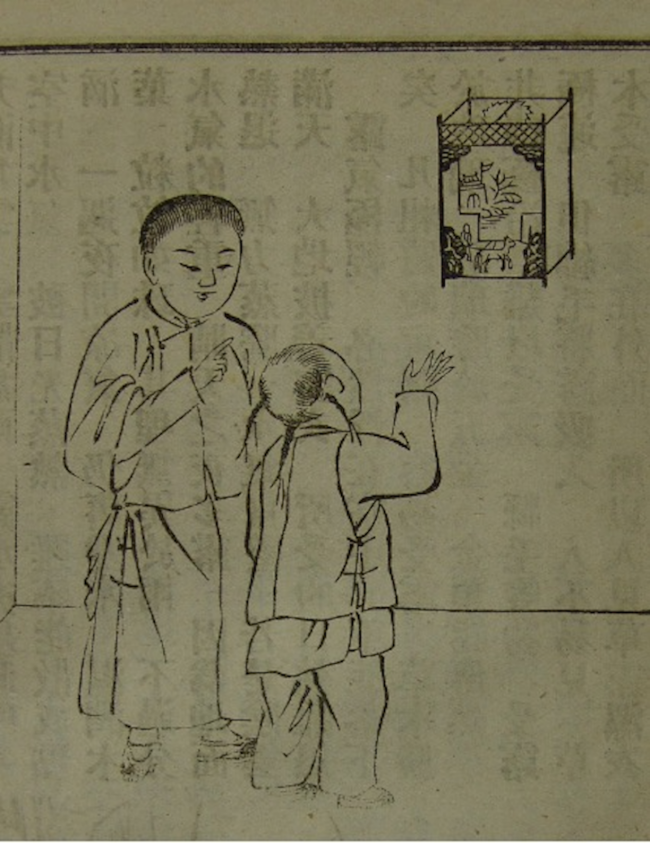VMPEA: Valentina Boretti

"New wine in old bottles?: The re-tagging of playthings in twentieth-century China"
Speaker: Valentina Boretti, Research Associate, Department of History, SOAS
Discussant: Zhang Xi, Ph.D Candidate, Department of Art History, UChicago
In twentieth-century China, toys became signs and agents of child and adult improvement, or lack thereof. Pacing-horse lamps like the one shown above, for instance, could equally serve to introduce children to science and patriotism; or to demonstrate Chinese inanity in having used scientific principles to produce a mere toy; or instead to reveal Chinese resourcefulness and precocious command of science. The significance of toys was, in turn, a consequence of the premium importance assigned to youths.
Advocating the cultivation of vigorous subjects, as opposed to the lethargic inadequacy that allegedly marked Chinese personhood, reformers and cultural brokers disseminated from the late nineteenth century a discourse of childrearing and education that reframed playthings as key formative tools. For ‘new’ children, they posited, would be shaped only by means of educational methods that seconded their peculiarities, which ‘tradition’ supposedly had ignored. Having construed the young as ‘instinctively’ play-loving and mobile, this discourse then identified toys as tools for providing imperceptible (hence more effectual) moral, intellectual, aesthetic, and physical instruction to children as they played. Yet, to achieve this goal, toys ought to be ‘appropriate’, namely educational, scientific, attractive, safe, ideally movable and novel.
Drawing on textual, visual and material sources dating from the 1900s to the 1960s, my talk will explore these discursive labels across political regimes: for – with moderate variations – the discourse of toys seamlessly transitioned from the Republican to the Maoist era, and most of the playthings that had raised citizens were found apt to raise successors. The talk will, moreover, note that whilst branding toys as indicative of advancement or backwardness, scientific, or conducive to political engagement was quite new, the objects these tags were appended to were often age-old. Old-ish bottles, in sum, were made to contain new-ish wine.
Valentina Boretti is Research Associate in the Department of History, SOAS University of London. She works on the cultural history of modern China, and has published on gender, material culture and childhood. Her research, funded among others by the British Academy, takes toys as a lens to explore child and adult citizen-building, mobilisation, and continuities or changes across regimes in twentieth-century China.
Xi Zhang has defended her dissertation entitled The City’s Pleasures: Urban and Visual Culture of Garden Spaces in Shanghai, 1850s-1930s and will receive her Ph.D. from the University of Chicago in March 2022. She is currently teaching at the School of Art Institute of Chicago as a lecturer. Her research and teaching focus on the history of modern Chinese art and architecture, with a particular interest in the interplay of spatial practices and visual culture within transcultural contexts from the eighteenth to twentieth centuries.
(Please use this link to register for the zoom meeting. The password to this zoom session is “toys0302.”)
Image details: Qimeng huabao 啟蒙畫報 1.2 (1903)
*The VMPEA’s in-person events are open to all invitees who are compliant with UChicago vaccination requirements and, because of ongoing health risks, particularly to the unvaccinated, participants are expected to adopt the risk mitigation measures (masking and social distancing, etc.) appropriate to their vaccination status as advised by public health officials or to their individual vulnerabilities as advised by a medical professional. Public convening may not be safe for all and carries a risk for contracting COVID-19, particularly for those unvaccinated. Participants will not know the vaccination status of others and should follow appropriate risk mitigation measures.